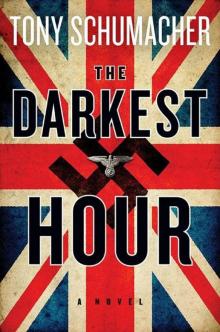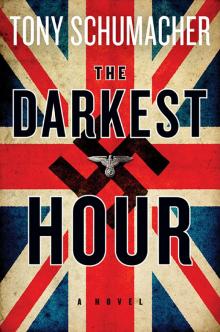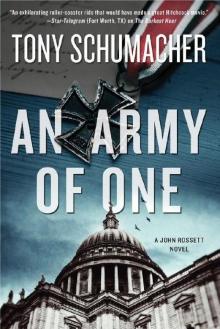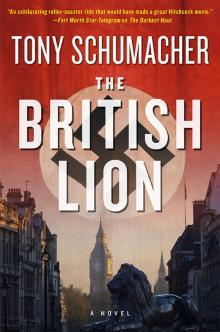- Home
- Tony Schumacher
The British Lion Page 2
The British Lion Read online
Page 2
They sat quietly as someone at the other end of the ward called for a nurse.
Nobody answered. Schmitt was doing his job.
“So, what happens to me now? Do I go to prison?” Rossett said.
“No.”
“Executed?”
“What’s the point? You’re already half dead.”
“So what, then?”
“You’re the British Lion, John, the Führer’s favorite Englishman, remember? You’re a hero, and the Reich needs heroes.” Koehler spun his cap again, then looked at Rossett. “So the Reich needs you.”
Rossett raised an eyebrow. “The Reich needs me or you need me?”
Koehler waved his hand and continued.
“The statement the British High Command will release is going to say that you were shot by the resistance as you tried to stop gun smugglers at Wapping docks. You were working for the Reich, assisting in the glorious battle against the cowardly communist and royalist resistance, who are determined on undermining the glorious future of Great Britain and the British Fascist Party. You bravely tackled a group of men who were about to launch a terror campaign against the civilian population. You nearly died protecting a platoon of German soldiers.” Koehler turned to Rossett. “The diary we found on you, the one you had in your pocket? It was pretty water damaged, but there were a lot of useful names and addresses we can use. That alone has given the Gestapo enough reason to celebrate.”
“No mention of Jacob?”
“Nobody will miss one Jewish kid.”
“Kate?”
“If anyone asks, she’s been transferred up north.”
“But nobody will ask?”
“Probably not. It’s best not to when people disappear, you know that.”
“But I don’t disappear. Why?”
“You’re a hero, and you will be rewarded for your heroism.”
“Rewarded.”
“You’re getting a medal.”
“What if I don’t want it? What if I don’t agree to this?”
Koehler shook his head and puffed out his cheeks.
“That is where things get tricky. If you don’t comply with this arrangement, all of this arrangement, I’ve been authorized to explain to you that you’ll tragically die of your wounds, probably here, probably today.”
“And you?”
“No doubt I’ll succumb to infection as well, or, if I’m really unlucky, I’ll end up out east fighting the Chinese and the Russians.”
Both men sat in silence, surrounded by curtains, amid the smell of hospital food and disinfectant.
The patient down the ward called out again, this time louder, but with no more success than before.
Rossett looked at Koehler.
“Die of my wounds?”
“Yes.”
“Maybe that would be easier?”
“Don’t be stupid, John. Just nod your head and we come through in one piece. Shake it and things will be exactly the same, except you’ll be dead and my wife will be a widow.”
“Why are they doing this for me?”
Koehler clenched his fist again and leaned forward, looking down at his boots once more.
“This hand hurts like hell.”
Rossett looked at the hand, then at his stomach.
“Swap?”
They stared at each other for a moment before Koehler’s eyes seemed to dim, the bright blue turning a sad shade of gray.
“If you die, the English High Command have to explain why they let the British Lion, the Führer’s favorite Englishman, charge around getting shot, just before the Führer sends someone to London to give him a medal. The Führer needs you, and he wants you standing up, not lying in a box. Keeping the Führer happy, that’s the number-one rule of being a high-ranking German officer. And the high-ranking German officers I answer to know this; that is why you will come through the other side of this.” Koehler straightened up again and looked squarely at Rossett. “The last few days have been—well, let’s just say they haven’t gone well for me. The shootings all over London, the dead soldiers—none of it looks good for my bosses and me, unless we can put a positive spin on the events. If we can paint you as a hero, things will improve, and my bosses can stand behind you. You get to take the glory, and we get to fight another day. If you die, I die, either in a cell in London or a trench in Russia. I’ll be honest, I don’t fancy either much.”
“If I die, what do I care?”
“Not a lot, but . . .”
“But?”
“They’ll follow up on Kate. She was my secretary, and she was seen with you before she fell off the face of the earth. We know she was helping you; we aren’t idiots. You might have got her out of the country with the kid, but they’ll track her down easily enough if they want to.” Koehler shook his head. “They can make things go badly for her over there.” Koehler leaned in close. “They know what strings to pull, John. They’ll let it be known to the Americans that she worked for the SS, for me, rounding up the Jews. They can also let it be known that she still is working for us. That’ll soon make its way to Canada. They can make her look very bad, very, very bad.”
“Even though it isn’t true?”
“Some of it is, some of it isn’t. All you need to know is that the British government abroad hangs traitors. You don’t want that for Kate, do you?”
“She wasn’t a traitor.”
“Maybe not at the end, but whether you like it or not, she was a traitor, same as you are. You were both working for the Germans, and you were both involved in rounding up Jews. That’ll get you on the end of a rope. Your agreement to the official explanation I’m offering you now will make certain she is left alone.”
“So I lie?”
“Doesn’t everyone?” Koehler tilted his head.
“Traitors to the truth,” Rossett replied, closing his eyes again.
“You got very close to her, John, in the madness of what was happening with the kid. I know you did. She was a special person. I was . . . well . . . I was very fond of her myself. If you have feelings for her, you’ll agree to what I’m offering.”
Neither man spoke for over a minute until Koehler tried again.
“Do we have a deal?”
“What about Schmitt, and the men who died?”
“If I go down, Schmitt goes down. He knows that; he isn’t an idiot. Shit rolls downhill, and if it doesn’t I’ll give it a push. He knows why I’m here, he knows what I’m saying, and he knows if we can make this stick we all stay alive, and maybe, just maybe, we’ll look good in the morning. If he keeps his mouth shut I’ll let him move on out of my office, which will buy his silence.”
“And the men?”
“This is war. Men die.”
“A dirty secret,” Rossett whispered.
“Our secret,” Koehler replied, looking longingly at the now long-dead cigarette butt. “You get your medal; I get to give my bosses the resistance men you killed and the timber yard full of guns we uncovered. You just need to agree with the account of what took place.”
“The man who shot me?”
“He’s an old soldier, don’t worry. Just nod your head, come on . . . please, John, for me, for my family?”
Rossett opened his eyes again and looked sadly at Koehler.
“I can’t decide what would be better, to live or die. Isn’t that terrible?”
“Live to fight another day.”
“I’m tired of fighting, Ernst; I can’t go back to that job, what we do . . . I can’t, not anymore. I’ve changed. I’m not that person, the man who loads the trains. I can barely live with the thought of what we did, what we do. I won’t do it again.”
“I can get you a nice quiet job, little office with some paper to shuffle, out of the way? I could maybe get you back in the pol
ice, just like old times? You just have to nod your head, take your medal, sign a statement. That’s all. Then you get a quiet life.”
“I want to be a policeman again. I want to go back to my old job.”
“Fine.”
“I’ll not put another soul in a boxcar. I want to do some good again, be a better man.”
“Okay, you can be a policeman.”
Rossett shut his eyes and rested his head back on the pillow. For a moment Koehler thought he’d fallen asleep, and he leaned forward slightly to check.
Finally Rossett spoke. “All right, I’ll sign.”
“It makes sense. We’ll be heroes, John, smelling of roses.”
“We’ll never be heroes again, Ernst, not after the things we’ve done.”
Koehler didn’t reply. He stood up off the bed and smoothed his tunic before looking down again at the man he hoped was still his friend. After a second or two he nodded silently and turned to leave through the gap in the curtains.
“Ernst?”
Koehler stopped and looked back at Rossett, who had opened his eyes again.
“Yes?”
“The boy, have you heard?”
Koehler rubbed his hand again before struggling to button his coat against the cold November afternoon that waited outside.
“They are on a plane to America. My contact in Dublin says the boy is well and has an American passport.”
Rossett closed his eyes and rested his head back on the pillow.
CHAPTER 2
ERNST KOEHLER TRIED punching some life into the pillow for what seemed the thousandth time that night, then rested his head on it once more.
In the distance Big Ben started to chime.
Six. He was an hour early.
He grunted, rolled out of bed, and picked up his dressing gown before crossing to the window.
He flexed his toes as he pulled back the heavy curtain an inch and looked out.
No snow: the forecast was wrong again.
He put on his dressing gown.
“Ernst?”
Koehler smiled, crossed back to the bed, and bent to kiss Lotte, his wife, softly on the forehead.
“Go back to sleep, it’s early,” he whispered.
“Come back to bed.” Lotte didn’t open her eyes. Just half her face was visible above the blankets, the rest hidden under her thick blond hair.
“I might as well do some work, now that I’m awake,” Koehler whispered as he brushed her forehead with his lips.
Before he could rise, Lotte reached with her arm and pulled him close. They kissed before she set him free, her arm snaking back under the blankets.
“I love you, Ernst Koehler.” Lotte’s voice was thick with sleep.
“I love you, Lotte Koehler,” Koehler replied as he pulled the blankets up further around her.
“I’m so happy, together again,” Lotte said, drifting off to sleep.
Koehler smiled, traced a fingertip across Lotte’s cheek, and left the bedroom, carefully closing the door behind him. He padded through the plush living room of his apartment and into the small kitchen, where he lit the stove and filled a kettle.
A small, sleepy-eyed black kitten appeared at the door. It yawned, flicked its head, then padded across until it was weaving around his legs, like long grass in a breeze.
Koehler felt the brush of the kitten’s tail and looked down. He smiled at the get-well-soon gift from Anja, his daughter. She had christened the kitten “Schwarz,” and Koehler had a feeling that when it was time for his wife and daughter to go back to Berlin, little Schwarz would be going with them.
Koehler hoped he would be going, too.
“We’ve got a big day ahead of us, little Schwarzy. Today we find out if I’m ever going to leave this shithole, England.”
Schwarz purred even louder.
“Maybe we’ll get a house with a garden for you?”
Schwarz sat down, staring at Koehler.
“Or would you sooner leave me here, and go back to Germany with just Lotte and Anja?”
Schwarz meowed and Koehler smiled, as the kettle started to boil.
“Yeah, sure. You just want your breakfast.”
CHAPTER 3
YOU WANT TO come back?”
“I’d like to.”
“You want to come back here?”
“Yes.”
“Be a policeman?”
“Yes.”
“Here?”
“Yes.”
Chief Superintendent Bernard Reade leaned back in his chair. He looked at Rossett’s written request, then back up at Rossett, who was standing directly in front of his desk.
“Here?”
“Yes.” Rossett tried not to frown.
“Wapping?”
“Yes . . . sir.” Rossett heard his nerves stretching in his reply.
“There is nowhere else you’d rather go? A desk at Scotland Yard, maybe? Nice office, secretary, spot by a teapot?”
“No, sir.”
“You want to come back here?”
“I do.”
Reade tapped his index finger on his top lip, adjusted his position in his seat, and leaned forward so that his elbows were back on the desktop.
“It’s just that, well—and please remember, this isn’t me saying this, Rossett, this is just me letting you know that . . . well . . .”
“People might not want to work with me, sir?” Rossett filled in the blank.
Reade nodded, opening his hands as he did so.
“It’s not that you aren’t a good policeman. I’ve read your record.” Reade looked around his desk for the folder, gave up, and smiled at Rossett. “Plus there is all that medal-winning stuff in France, which was exceptional work.”
Reade waited for Rossett to reply, but Rossett was staring out of the window at the Thames, watching a barge battle the wind, as he waited for whatever was going to come next.
“Inspector?”
Rossett looked at Reade, who tried again.
“Your exploits in France, they were exceptional.”
Rossett nodded.
Reade chewed his lip and scratched behind his ear, then gestured that he wanted Rossett to say something.
Rossett blinked, turned his head a quarter of an inch, sighed, and then spoke.
“I was told I could apply to any station that I wished. I was told that my application would be a formality. I was told that I would be allocated a detective role commensurate with my rank.”
“But here?”
“Yes, here.”
“Why?”
“This is where I started my career, this is where the challenge is, and this”—Rossett paused, fixing Reade with a stare—“is where I want to be.”
Reade removed his spectacles and rubbed his eyes with his finger and thumb, then squinted up at Rossett, who had returned to staring out of the window.
“I’ve had no official confirmation of this, Rossett.” Reade sounded tired.
“One phone call can get you that, sir.”
“I don’t even know for certain if you’re still a policeman.” Reade offered up his hands to Rossett, then flopped them back down.
“I’ve still got my warrant card.”
“But you work for the Germans. I’ve checked. We don’t pay your wages; you don’t have an office, or a department, or men working under you.” Reade gestured to the window.
“Find me a job, sir.” Rossett looked at Reade.
“It isn’t that easy, Inspector.”
“I can do anything. My record speaks for itself.”
“That’s part of the problem, John.” Reade used Rossett’s first name for the first time. “Your record does speak, and what it says is, quite frankly, terrifying at times.”
> Rossett raised an eyebrow as Reade wiped a hand across his mouth, regretting what he had said, aware that Rossett was still very much connected to his Germans.
He tried again, conciliatory this time, leaning forward, letting his chair rock with him.
“Look.” He glanced at the request. “John, this is difficult for me to explain to you, but you’re well known here. From your time before the war and since you’ve been working for the Germans.”
“And?”
“And that has made some people reluctant to be associated with you.”
“I don’t care.”
“But I do, John. I have to look after you. I have to worry about your safety.”
“I look after myself.”
“I can see that from your personnel file.” Reade cast an eye around the desk for the file again, then looked back at Rossett. “Look, I don’t know how else to say this.”
“Just say it.”
Reade frowned, scratching his cheek as he took a deep breath. “If you return to policing, you will be in danger.” The words finally tumbled out.
“Every policeman is in danger; it’s the nature of the job.”
“Yes, but you’ll be in danger from everyone, John. Criminals, resistance, and, even though I hate to say it, you’ll be in danger from fellow police officers.”
Rossett went back to staring at the dirty black barge banging its prow against the incoming tide of the muddy brown Thames.
He knew how it felt.
Reade tried again.
“I don’t know how else to tell you, but you’re hated here. And not just here: you’re hated all over London.”
“I’ve just been following orders.”
“It isn’t just about what you do with the Germans. Let’s be honest, John, you weren’t exactly popular before the war, either.”
Rossett looked at Reade, who gave a slight shake of his head.
“Don’t shoot the messenger; just try to understand the problem from my point of view.”
“I just want to be a policeman.”
“As that may be, I have to be careful.”
“So I just carry on floating around?”
Reade leaned back in his chair again, his hands now holding the edge of his desk, as if he were expecting Rossett to snatch it away.

 The Darkest Hour: A Novel
The Darkest Hour: A Novel The Darkest Hour
The Darkest Hour An Army of One: A John Rossett Novel
An Army of One: A John Rossett Novel The British Lion
The British Lion